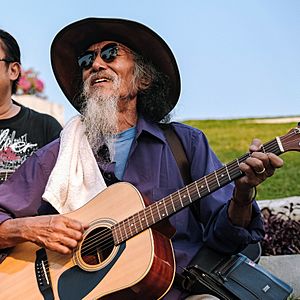Ye Lwin (musician) facts for kids
Quick facts for kids
Ye Lwin
|
|
|---|---|
 |
|
| Background information | |
| Native name |
ရဲလွင်
|
| Born | December 1947 Paungde, Pegu Division, British Burma (now Myanmar) |
| Died | 10 July 2018 (aged 70) Yangon |
| Genres |
|
| Occupation(s) |
|
| Instruments | guitar, vocal |
| Years active | 1974–2018 |
| Associated acts | Mizzima Wave |
Ye Lwin (Burmese: ရဲလွင်; December 1947 – 10 July 2018) was a famous musician from Myanmar. He was a talented guitarist and a strong supporter of peace. He was known for playing bass guitar and singing in the band Mizzima Wave. Ye Lwin was also an important voice in Myanmar's peace movement.
Early Life and School
Ye Lwin was born in December 1947. His hometown was Paungde, in what was then British Burma. This area is now called the Bago Region in Myanmar. He grew up in a family that loved music and was Christian. Ye Lwin was one of ten children in his family.
In 1968, he started studying at the Rangoon Institute of Technology (RIT). However, he decided to leave school during his third year.
Music Career
Ye Lwin began his music journey in 1974. He played the bass guitar for a band called "E-machine." This was while he was still a university student.
In 1984, he helped create a very important rock band called "Mizzima Wave." He started it with his friends Khin Maung Toe, Ko Ne Win, and Ko Maung Maung (Azali). The band became very popular in the 1980s and 1990s. They were known for their original songs. Ye Lwin played the bass guitar for the band.
He wrote many of his own songs. One of his most famous songs was "Pan Kayan Pya" (Violet Flower). This song was so popular, but it was also banned by the government for many years. Mizzima Wave also used their music to help people. They raised money for war victims and worked to end conflicts.
In 2012, Ye Lwin started a group called "Panyelann." This name means "Path of Flowers." They were a group of street musicians who played music for charity. Since May 2012, they raised money for people in Kachin State. Ye Lwin wrote about 200 songs during his life as a musician.
Working for Change and Peace
Ye Lwin was a student activist at RIT. He took part in student protests, like the 1976 Hmaing Yar Pyae uprising. Because of his activism, the government at the time banned his songs. They also stopped him from performing.
In 2007, Buddhist monks led peaceful protests in Myanmar. This event was called the Saffron Revolution. Ye Lwin joined these protests. He recited verses about loving kindness. When the government stopped the protests, he was arrested. He was held for several months. As a punishment, the government did not allow his name to be used in public. This meant his name could not appear on album covers.
His work for peace officially began in 2012. He started a group of young musicians. They held weekly fundraising concerts in teashops around Yangon. Their motto was "People helping people." The group, "Panyelann," first aimed to help people affected by the war. This was the conflict between government troops and the Kachin Independence Army (KIA) in Kachin State.
His Beliefs
Ye Lwin grew up in a Christian family. He used to sing and play music in church. As a young adult, he stopped going to church. Years later, he found inspiration in the writings of a person named Paragu. Slowly, Ye Lwin became a Buddhist. He also started eating a vegetarian diet. His Buddhist faith greatly influenced his peaceful views and his music.
Death
On June 18, 2018, Ye Lwin was taken to the hospital. He was suffering from liver cancer. He passed away on July 10, 2018, at around 4:05 PM. He was buried at Yayway Cemetery on July 14, 2018.

